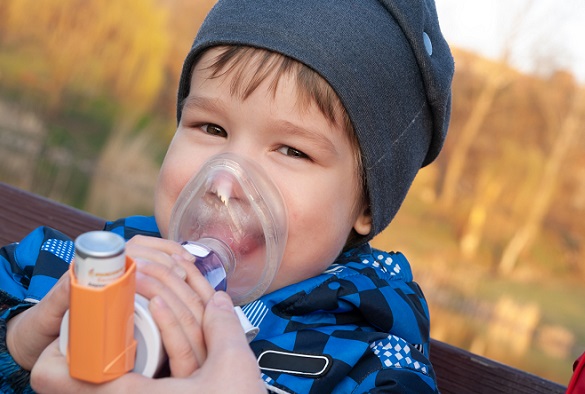
A new Liverpool-led national clinical trial aiming to find the best treatment for children with mild asthma has been awarded £1.5m from the National Institute for Health Research (NIHR).
Asthma is the commonest long-term disease in children in the UK, affecting over a million children. It causes cough and difficulty breathing. This happens because the airways narrow, due to swelling and irritation. These symptoms get worse during asthma attacks.
The UK has some of the worst results for children with asthma in the world. In the UK a child with asthma is admitted to hospital every 20 minutes and 20 children die each year from asthma attacks.
Background
Currently, the main treatment for asthma is a preventer inhaler, containing steroids, which prevents irritation of the airways. For many years health professionals have been advising children with asthma to use their preventer inhaler every day. This reduces symptoms of asthma and prevents attacks. However, new guidelines recommend that taking a preventer inhaler every day might not be required in all children. The new guidelines recommend that in mild asthma, the inhaler could be taken only when people have symptoms. The main advantage of this approach is that people would not be exposed to potential side effects of steroids if they were well. These changes are based on results of recent studies in adults, and some teenagers, with asthma.
In the studies, researchers looked at what happens if adults and adolescents only take their preventer inhaler when they have symptoms of asthma. They compared this to when people take their preventer every day. They found no difference in the risk of having asthma attacks, regardless of whether the preventer inhaler was used every day or just when people had symptoms.
Trial
There is a need to compare these approaches in children, rather than rely on results of studies in adolescents and adults. Asthma in adults is different from asthma in children therefore it is difficult to know what to recommend for children aged 6-16 years. Less preventer inhaler may make their asthma symptoms worse but using them too much can cause unwanted side-effects.
In order to learn how best to treat children with mild asthma, a team of researchers from across the UK, led by co-Chief Investigators Associate Clinical Professor Ian Sinha from Alder Hey Children’s NHS Foundation Trust and Professor Paula Williamson from the University of Liverpool, have launched a new clinical trial to find out if taking a preventer inhaler only when a child has symptoms is as effective as taking it every day. Appointing co-Chief Investigators for this study recognises the clinical and methodological expertise required to deliver the study.
The study, Assessing SYmptom-driven versus Maintenance Preventer Therapy for the Outpatient Management of AsThma In Children (ASYMPTOMATIC), will involve around 250 GP practices across the UK. Parents of children with mild asthma at any of these practices will be asked if they would like to take part. If the parents agree, their child will be randomly assigned to one of two different approaches to using the preventer inhaler. They will either take it every day, or only when they have symptoms of asthma. Care for the children will then be as it would in routine practice, and the data required extracted from electronic health records, thus minimising the burden for participants.
Innovative study
The study has been awarded more than £1,597,900 worth of funding from the nation’s largest funder of health and care research, NIHR.
Associate Clinical Professor Ian Sinha, said: “The trial will answer one of the most pressing and important questions about the fundamentals of managing childhood asthma. This is a condition which affects many millions of children, worldwide. We need a study to know the best way to control their inflammation – on the one hand we don’t want to put children at risk of asthma attacks, but on the other hand we don’t want to expose them to side effects of medications if we don’t need to. Given the differences between paediatric and adults asthma, it is right that we conduct studies in children”.
Paula Williamson, Professor of Medical Statistics and Lead for the MRC/NIHR Trials Methodology Research Partnership (TMRP), said: “This funding will enable us to conduct this innovatively designed study which will use routinely collected data, in collaboration with Clinical Practice Research Datalink and the Liverpool Clinical Trials Centre. This type of study directly responds to the top priority identified by patients and the public for clinical research, namely, to answer how can randomised trials become part of routine care and best utilise current clinical care pathways?”
The following organisations are also involved in the study; Queen Mary University of London; Bangor University; Asthma UK Centre for Applied Research, The University of Edinburgh; The National Heart and Lung Institute, Imperial College London.